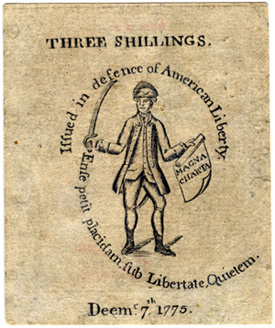Magna Charta

Back of a Massachusetts Three Shillings note on
which an American is depicted holding the Magna
Charta "in defence of American Liberty."
Magna Charta, forced upon King John of England in 1215 by a group of rebellious barons, was the first written document intended to define limits to royal authority. It listed ancient English liberties that the king was not to transgress, including judicial proceedings limited taxation, and attempted to curb habeas corpus. It also established England's first parliament in the common council, a group of influential men whose allegiance was not necessarily to the king and who regulated taxation. A definitive version of the charter was issued and accepted by the crown in 1225, giving it the force of law.
Magna Charta gained renewed prominence in the early seventeenth century when its legacy was employed by legal thinkers such as Sir Edward Coke against the arbitrary actions of King Charles I. Coke, declaring that "Magna Carta...will have no sovereign," asserted that it embodied the authority of the common law and established the principle that monarchs could not transgress it. Subsequently, the document began to achieve supreme symbolic importance and came to be seen by some as reflecting ancient English rights before they were perverted by French influences after the Norman Conquest. Of course, not all of those invoking the ancient document had actually read it, and many—including some American colonials protesting British taxation—attributed to it ideals that it did not, in fact, contain. Nevertheless, the ideas of Coke and others about the primacy of the rule of law in the English constitution and other rights found their way into the seventeenth-century colonial charters and eighteenth-century state constitutions, for Coke's writings on law were a standard part of eighteenth-century legal education throughout the British world.





